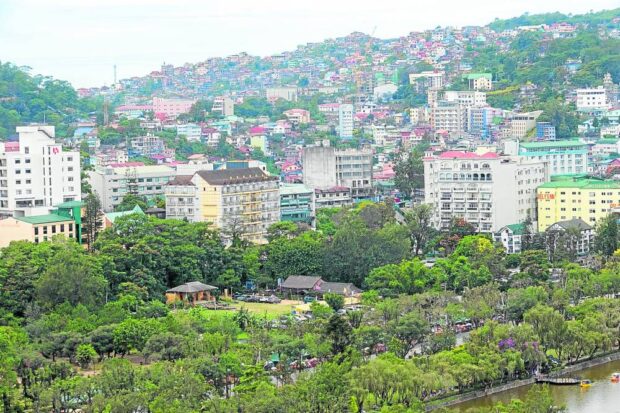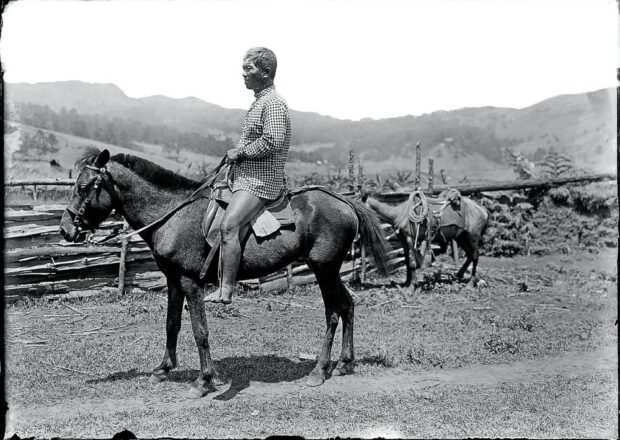Monument to ‘Native Title’ hero to rise at Burnham Park

FACELIFT The Ibaloy Heritage Garden at Burnham Park (area with stage and huts) will soon be turned into a major destination complete with flower landscapes that showcases Baguio’s indigenous past. One of its highlights is a statue of Ibaloy leader Mateo Cariño who won a landmark decision from the US Supreme Court recognizing indigenous Filipino native rights at the beginning of the 20th century. —NEIL CLARK ONGCHANGCO
BAGUIO CITY—A Burnham Park monument is finally being put up to honor the late 19th-century Ibaloy clan leader who sued the Americans and won a judicial doctrine that recognizes indigenous Filipino ancestral land rights.
The proposed statue of cattle trader Mateo Cariño, which depicts him on horseback as he is portrayed in one of his most recognized photographs, would be part of an improved Ibaloy Heritage Garden inside the century-old park using a P78-million national allocation that was reportedly worked out by Sen. Robinhood Padilla.
The statue would be perched on a pedestal and would face Burnham Park’s Melvin Jones Grandstand.
Set between the Baguio Orchidarium and the children’s playground, the 300-square-meter garden would also house an Ibaloy Museum.
The Ibaloys are the subjects of the city’s cultural mapping project, including their only ancestral domain at Happy Hallow, a community inside the Camp John Hay reservation.
Article continues after this advertisementBook 1 of the project pieced together oral, physical and documented evidence of the Ibaloy’s existence in Baguio, and has been transmitted to a central repository of the National Commission for Culture and the Arts.
Article continues after this advertisement
OWNER Camp John Hay in Baguio City used to be cattle land owned by Ibaloy leader Mateo Cariño, who is often shown on horseback in old photographs. His lands were sequestered by the American colonial government in the 1900s but the US Supreme Court later ruled that Cariño had the “native title” over those lots. —PHOTO FROM THE DEAN CONANT WORCESTER COLLECTION
READ: Baguio fire department gets title over parts of Burnham Park
READ: Baguio to transfer title of Burnham Park to Tieza
Consultation
Vegetables and coffee would be grown on farms in the Heritage Garden and those would be sold at a coffee shop in the middle of a boardwalk encircling the “avong,” or communal house, that would also be modernized.
A central gathering area would also be constructed where rituals and festivities would be held, according to a design presented to the council by Ibaloy architect Keenan Camilo.
The plans were discussed at a special session of the city council on Tuesday because of an appeal made by Cariño’s descendants that they should continue to be consulted about the project.
Lawyer Rhenan Diwas, city environment and parks management officer, assured the grandchildren of Mateo and his wife, Bayosa, that the project would not deviate completely from plans authorized by the family and the Odjon ti Ivadoy (United Ibaloys) who oversee the Heritage Garden.
Some changes may happen but these are “technical” in nature, Diwas added.
The Ibaloy Heritage Garden was set aside for the city’s Ibaloy community in 2010 through City Council Resolution No. 182, a year after the Baguio government declared Feb. 23 as Ibaloy Day during the city’s centennial celebration.
The date was significant because it was on Feb. 23, 1909, “when the United States Supreme Court recognized the legitimacy of Mateo Cariño’s struggle for Native Title and to give due recognition to the original indigenous inhabitants of the city,” according to Resolution No. 182.
Cariño, who was born in the mid-1800s, had questioned the sequestration of his lands by the American colonial government to house a military garrison that is now Camp John Hay.
Private rights
The unanimous decision penned by American Justice Oliver Wendell Holmes concluded that the Ibaloy had clear private rights over his lands.
Now called the “Native Title Doctrine” (or the Cariño Doctrine), it was the legal foundation for the Indigenous Peoples Rights Act of 1997 (Ipra) as well as protection for indigenous peoples rights in the 1987 Constitution, said Linda Grace Cariño, granddaughter of Jose Cariño, one of Mateo’s children who served as Baguio mayor shortly after World War II.
Because of the Native Title Doctrine, the country has “laws that protect, safeguard and promote IP rights, and which actually address and repair historical injustice committed against the IP,” said Linda Grace.
The monument helps correct false assumptions about Cariño, including claims he sold Camp John Hay to the government, which the heirs continue to dispute, she said.